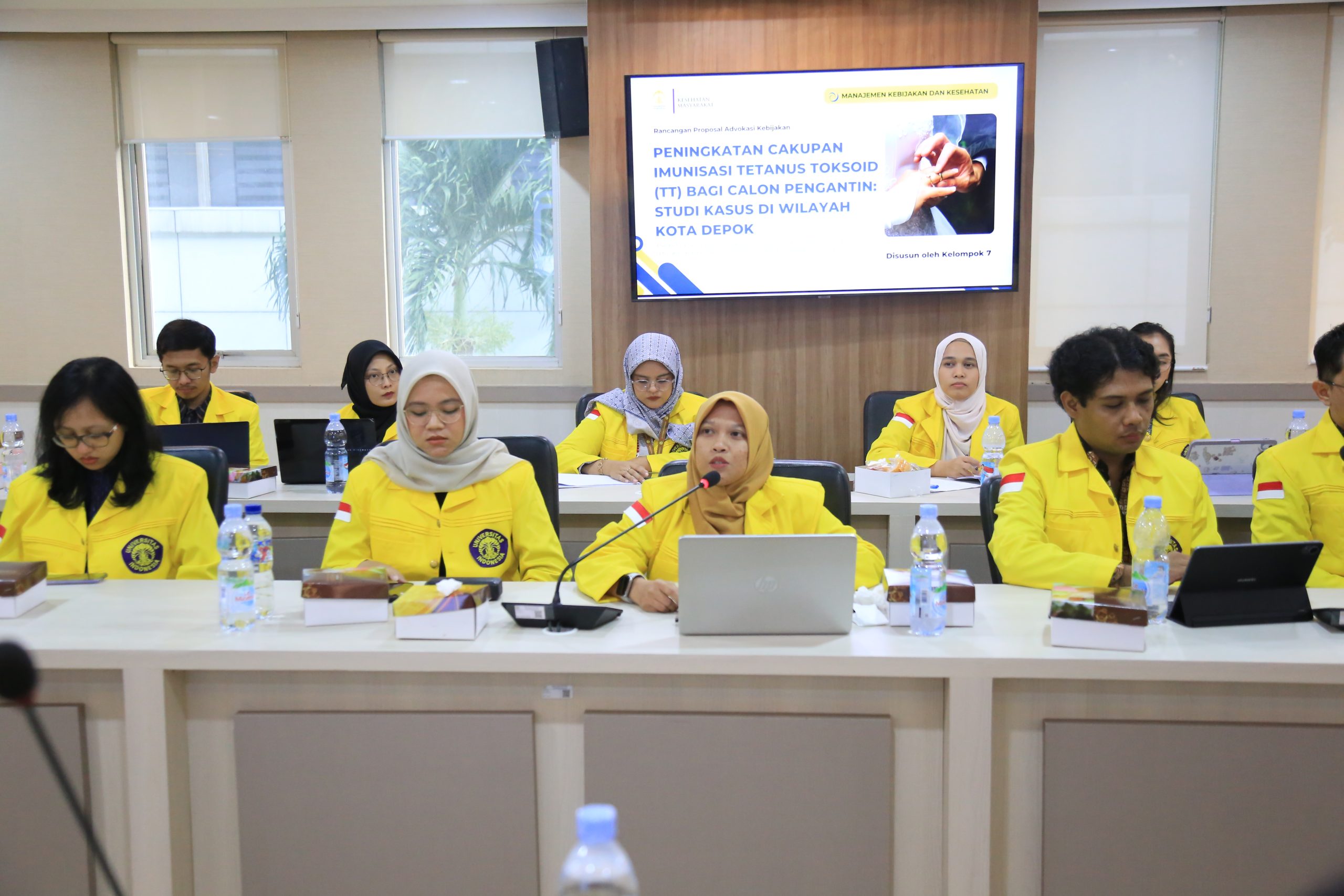The Faculty of Public Health (FPH) of Universitas Indonesia (UI) held a strategic audience with Commission IX of the Indonesian House of Representatives (DPR RI) and Committee III of the Regional Representative Council (DPD RI) on April 24, 2025. The aim was to advocate for evidence-based policymaking. Held at the DPR and DPD buildings in Jakarta, this dialogue provided a platform for Master’s students of Public Health Sciences at FPH UI to present field study findings and policy briefs highlighting the current conditions, challenges, and strategic recommendations regarding public health in Indonesia.
This audience was part of the “Health Management and Policy” course, taught by Dr. drg. Masyitoh, M.A.R.S., and Dr. Yulianti Susilo, M.A. The outcomes are expected to serve as valuable input for the formulation and oversight of national policies, especially in the health and public welfare sectors. Dr. Masyitoh emphasized that such collaborations could be sustained in the future, especially with continued interest from legislative members. Academic research, she added, is conducted in collaboration with students from diverse backgrounds—both medical and non-medical—hailing from various regions in Indonesia, thus enabling more comprehensive studies.
The leadership of Commission IX of the DPR RI warmly welcomed the presence of FPH UI students, noting that the dialogue represented a factual assessment of health conditions in Indonesia, particularly in several regions that served as case studies. The audience was also formally received by Committee III of the DPD RI. In their remarks, Committee III representatives stated that the activity aligned with the directives and priorities of DPD RI leadership. Committee III, as one of DPD RI’s standing bodies, is responsible for legislation and oversight in various sectors, including education, religion, culture, health, women’s empowerment, child protection, and family planning. Currently, the committee is drafting amendments to Law No. 40 of 2004 on the National Social Security System, with particular attention to protecting vulnerable groups such as informal workers and traffic accident victims.
During the session, seven critical public health issues were presented, each analyzed through a case study approach across different regions. One of the key topics was the optimization of adolescent-friendly health services (PKPR). Despite being initiated by the Ministry of Health in 2003, implementation remains challenging. For example, in DKI Jakarta, only around 66.9% of junior high schools and 77.8% of senior high schools have access to these services. Major obstacles include a lack of trained health personnel, inadequate facilities, limited funding, and low awareness among adolescents. Students recommended strengthening the capacity of health workers, developing cross-sectoral regulations, and ensuring the provision of dedicated facilities and budgets through national (APBN) and regional (APBD) funding.
Another highlighted issue was the urgency of cervical cancer prevention through the “Bekasi Zero Cervical Cancer” initiative. Although the disease imposes a significant socio-economic burden, early detection participation remains low. Key challenges include suboptimal promotion and education, limited medical equipment, lack of regional action plans, and insufficient budget allocation. Students urged stronger community health volunteer roles, improved cross-sectoral coordination, service innovation, sustained outreach via community leaders, and increased budgetary support.
The quality of public health center (puskesmas) services was also a concern, especially regarding unequal distribution of healthcare workers. For instance, in Tanjung Jabung Timur Regency, one doctor serves over 5,000 JKN participants. Additionally, approximately IDR 1.3 billion in capitation funds went unutilized in 2024. Students proposed reformulating performance indicators to align with local contexts and improving capitation payment mechanisms for greater fairness and transparency.
The growing consumption of sugar-sweetened beverages (SSBs) contributing to adolescent obesity was another focus. Students stressed the urgency of control measures, such as accelerating the enactment of SSB excise taxes, simplifying nutrition labeling, restricting advertisements during children’s viewing hours, and banning the sale of SSBs in schools and public spaces.
Child sexual violence was also addressed, with 2024 UNICEF data indicating that 20% of the 375 million global cases occurred in East and Southeast Asia. In West Java, response barriers include limited outreach, stigma, and weak law enforcement. Students advocated for the implementation of comprehensive sexuality education starting from an early age, in a phased approach, grounded in religious and cultural norms. They called for this to become a mandatory curricular activity supported by regional funding (APBD).
Commission IX member Edy Wuryanto emphasized the importance of collaboration between the DPR, academia, and relevant ministries/agencies to mitigate the health risks of excessive SSB consumption. “This audience is a first step toward advocating for clearer, more focused regulations. We hope all stakeholders take the SSB issue seriously to protect the public—especially youth—from related health risks,” Edy stated.
Improving tetanus toxoid (TT) immunization coverage for prospective brides and grooms was also discussed, in light of a 2023 surge in cases, including 8 infections and 4 deaths in West Java. Students recommended drafting regional regulations, digitizing immunization records, and integrating programs and mass immunization campaigns sustainably.
Lastly, the urgency to halt HIV transmission toward the goal of ending AIDS by 2030 was raised. Recommendations included harmonizing local and national regulations, strengthening the role of local AIDS Commissions (KPA), expanding HIV testing and care services at puskesmas, and integrating comprehensive reproductive health education into the national curriculum.
At the conclusion of the session, Commission IX of the DPR RI expressed appreciation for the research findings presented by FPH UI graduate students, describing them as valuable input for discussions with ministries and relevant agencies. Committee III of the DPD RI also deemed the policy briefs highly relevant in supporting their constitutional duties, particularly in bridging the gap between national policies and regional needs. As an academic institution, FPH UI reaffirmed its commitment to contributing to evidence-based public policy that prioritizes the public interest.
(DFD)

